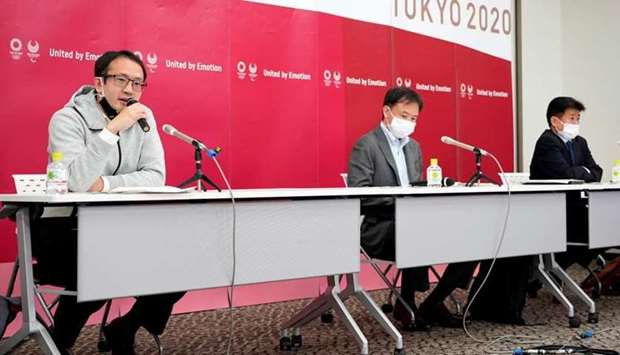* State of emergency will last until a month before Games begin
* Health system straining, concerns infections will rise
* Public anger at IOC comments mounts
* Risks for PM Suga ahead of leadership vote, election
* Economy likely to contract in April-June quarter-economist
Japan on Friday extended a state of emergency in Tokyo and other areas by about three weeks to June 20 as the Covid-19 pandemic shows no signs of easing less than two months before the Summer Olympics open.
The state of emergency in the capital and eight other prefectures had been scheduled to end on May 31, but strains on the medical system remain severe.
Japan has seen a record number of Covid-19 patients in critical condition in recent days, even as the number of new infections has slowed.
"In Osaka and Tokyo, the flow of people is starting to creep up, and there are concerns that infections will rise," Economy Minister Yasutoshi Nishimura, who also heads the country's coronavirus countermeasures, said at the start of a meeting with experts.
The experts later approved the government proposal and Prime Minister Yoshihide Suga officially announced the extensions.
Worries about variants of the novel coronavirus and a slow vaccination drive have prompted urgent calls from doctors, some high-profile business executives, and hundreds of thousands of citizens to cancel the Olympic Games, due to start on July 23.
Japanese officials, Olympics organisers and the International Olympic Committee (IOC) have said the Games would go ahead under strict virus-prevention measures. IOC's senior official John Coates, who oversees the preparations, said last week the Games were on whether or not the host city, Tokyo, is under a state of emergency at the time.
Tokyo 2020 Organising Committee President Seiko Hashimoto told a news conference she had received pledges from India - now battling a deadly second Covid-19 wave - and five other countries to vaccinate all their Olympic delegates as a measure against a new variant that has emerged in India.
IOC President Thomas Bach has said 80% of the 10,500 athletes expected in Japan would be vaccinated and on Thursday urged Olympians to get their shots if they could. Delegates must also be tested before and after arrival.
Comments by IOC officials appearing to dismiss Japanese concerns have sparked outrage on social media, including IOC's Bach telling an International Athletes Forum on Thursday: "Come with full confidence to Tokyo and get ready", calling Tokyo the "best prepared Olympic city ever".
"I want to say 'shut up'," said one Twitter user. "Let's beat up on the IOC, which denigrates Japan, and halt these crazy Olympics."
Japan has recorded about 727,000 coronavirus infections and 12,597 deaths so far. About 6% of its population has been vaccinated, according to Reuters data, the lowest among the world's larger, rich countries.
Under the government's current plan, about 30% of the population would be vaccinated by the end of July, Nishimura said.
After meeting with Japanese officials on Thursday, European Commission President Ursula von der Leyen backed Tokyo's hosting of the Olympics and said the European Union had authorised the export to Japan of more than 100 million vaccine doses, enough to inoculate about 40% of the population.
International spectators will not be allowed for the Games but some 90,000 people including athletes and their delegations will be coming. No decision has been made yet on domestic fans and Tokyo 2020's Hashimoto said the situation regarding the state of emergency would need to be taken into account.
Polls show a majority of Japanese want the Games, postponed last year due to Covid-19, either cancelled or put off again.
That is a worry for Suga, whose support has slid over his handling of the response to Covid-19 and who faces a general election and a ruling party leadership race later this year.
But cancellation would carry its own political risk for the premier, some ruling party lawmakers said.
"The demerits would outweigh the merits," Liberal Democratic Party MP Hajime Funada told Reuters. "It would give the impression that Japan is in such dire straits it cannot hold the Games."
Japan's latest emergency steps, unlike stricter measures in many countries, have focused mainly on asking eateries that serve alcohol to close and those that don't to shut down by 8 p.m.
Nomura Research Institute executive economist Takahide Kiuchi said an extension of the states of emergency would mean the economy would likely contract in the current quarter, pushing it back into a recession.

